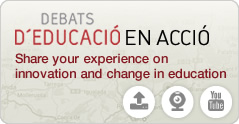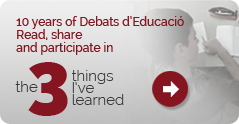You are here
Social Open Learning: Can Online Social Networks Transform Education?
About the speaker
Philipp Schmidt
Director's Fellow at MIT Media Lab and Co-founder of Peer 2 Peer University, MIT Learning Creative Learning and OpenCourseWare Consortium
Main ideas
“The best way to predict the future is to invent it”
A look at the past and present of education
The image of the lecturer at the front of an auditorium giving a master class has been repeated throughout the history of universities and continues to be the basis of university teaching.
For Philipp Schmidt, these master classes are not the educational experiences that motivate learning or have the greatest impact on students.
A few examples:
- Analysis of MIT students with electrical impulse sensors showed that during master classes mental stress levels were similar to those of relaxation.
- Schmidt conducted a survey of MIT students on what experience had been most relevant in their learning. The speaker highlighted the response of a student who explained that the experience that most marked her learning was a project over six months in which students studied how to lift a fire truck on to the dome of the MIT main building. The action was carried out in one night and the instructions on how to undo it were left behind.
What, then, should learning be like to be effective and creative?
With the four “Ps”:
- Projects. When we build something, we put theoretical knowledge into practice, we discover if it’s right or not, we face real problems and we produce something that we can then show to others. Studying poetry is not the same as writing poetry.
- Peers. A study shows that the ability to create collaborative work groups that work is the most important factor in achieving success. In the group, doubts are shared. Everyone contributes their knowledge. When we tell others our knowledge we have to face up to whether we know certain questions or not and that makes us learn.
- Passion. If we’re interested in a subject, we’ll learn more than if we’re not. “We try to help our students to find projects that enthuse them and that they think can change the world.”
- Play. Take risks, try things out, don’t fear failure. Learning should be a process in which we take risks.
The following are three principles that the MIT Media Lab proposes for what projects should be like to have maximum impact.
- Unique. If we’re doing something that’s already been done, change.
- Impact. It’s not enough to have an idea. It has to change people’s lives. It has to have a meaning.
- Magic. It cannot be defined. But when you find it, you’ll know. It’s a feeling, a sense.
Technology as driving force for changing the education paradigm
Technology can be used to perpetuate the classical model of teaching. For example, watching a video is a one-way task. The student listens and there’s no interaction. It’s the same model as the master class.
However, for Schmidt, technology can change the education paradigm in the same way that the book did in its day as, thanks to the internet, we have an open network where everyone can connect and contribute. It’s not like radio or television, which are one-way. It’s interactive. We can speak and listen. It is the basis of peer-to-peer teaching.
There are motivated people all over the world. Yet opportunities are not shared equally. Technology can increase the opportunities to access collaborative learning.
Examples of collaborative peer-to-peer learning
- Learning creates learning, an initiative of the MIT Media Lab. It is not a normal online course. The Media Lab acts like the host at a party. It proposes ideas and creates forums for debate. Then, it is the participants who propose new subjects and who contribute the elements for the development of the course. Some 25,000 people took part and 450 work groups were created. It was the students themselves who ran the groups. Co-creator communities were created.
- EduCamps. These are not ordinary conferences. They are called unconferences. It is the participants at the conference who propose debates and who take part in them, whether on or offline.
“Open social learning is the future.”
Discover
other ideas
-

Conference
Debats d'Educació
2014 -

How can we build an engaged educational community?...
Valerie Hannon
2014 -

Envisaging the future of education. 10 years of de...
Núria García Quera and Júlia Martí Comas
2014






 The texts published on this website are, unless otherwise indicated, covered by the Creative Commons Spain Attribution - Non Commercial - No Derivs 3.0 licence. You may copy, distribute and transmit the work, provided you attribute it (authorship, journal name, publisher) in the manner specified by the author(s) or licensor(s). You may not use the material for commercial purposes. You may not transmit any derivative work from this material. The full text of the licence can be consulted here:
The texts published on this website are, unless otherwise indicated, covered by the Creative Commons Spain Attribution - Non Commercial - No Derivs 3.0 licence. You may copy, distribute and transmit the work, provided you attribute it (authorship, journal name, publisher) in the manner specified by the author(s) or licensor(s). You may not use the material for commercial purposes. You may not transmit any derivative work from this material. The full text of the licence can be consulted here: